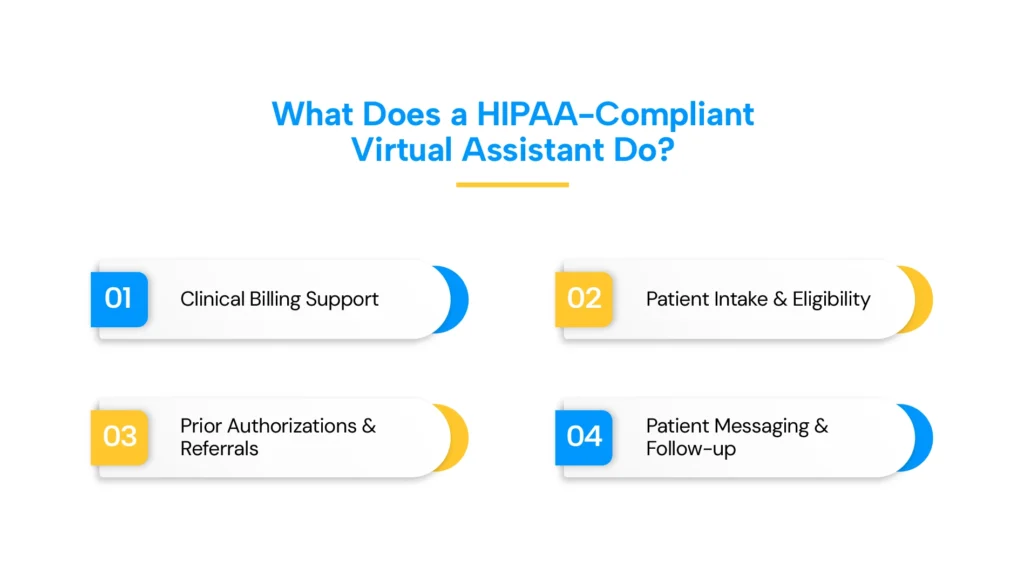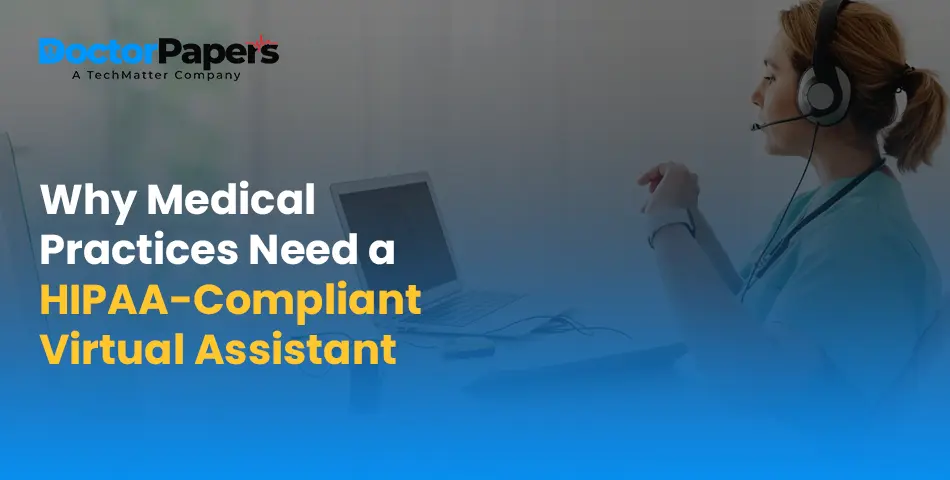Medical practices face hefty financial implications due to stringent privacy rules. In 2024 alone, the healthcare sector’s average data breach cost was about $9.77 million, making it the costliest industry. This financial risk highlights why practices must limit patient information exposure and use vetted vendors such as a HIPAA-compliant virtual assistant.
Trained remote assistants adhere to HIPAA safeguards, handle patient information securely, and free clinicians to focus on care. This has positioned these assistants as a practical investment for practices that want dependable back-office support.
This post will explore HIPAA-compliant virtual assistants and their value for modern healthcare practices.
What is a HIPAA-Compliant Virtual Assistant?
A HIPAA-compliant virtual assistant is a remote specialist who performs administrative and revenue-cycle tasks in accordance with HIPAA rules. They use encrypted systems and access controls. They sign business associate agreements (BAAs) and follow defined access logs, minimal data exposure, and role-based privileges.
An virtual assistant that complies with HIPAA guidelines conducts eligibility checks, follows up on prior authorizations, provides scheduling support, and delivers patient messaging. Unlike generic remote assistants, these assistants operate within regulated workflows and use platforms that meet security and audit requirements specific to healthcare.

What Does a HIPAA-Compliant Virtual Assistant Do?
A HIPAA-compliant assistant performs tasks that directly reduce back-office friction and support billing accuracy. Tasks are assigned by need and protected by policies. Typical duties include:
Clinical Billing Support
The virtual assistants prepare charts for coding teams, flag documentation gaps, and follow up on missing signatures to speed claim acceptance.
Patient Intake & Eligibility
The assistants confirm coverage, collect patient info, and update demographic details to prevent rejected claims.
Prior Authorizations & Referrals
HIPAA-compliant assistants also submit documents, track approvals, and alert clinical teams to pending authorizations that affect care delivery.
Patient Messaging & Follow-up
The online assistants handle secure appointment reminders, balance notices, and care instructions while preserving privacy and consent records.
Key Features of a HIPAA-Compliant Virtual Assistant
A HIPAA-compliant virtual assistant’s services entail the following features:
- Encrypted communication channels and secure file transfer for PHI.
- Signed business associate agreements and documented policies for audits.
- Role-based access, session logging, and multifactor authentication.
- Regular security training and incident reporting procedures.
A compliant assistant operates on secure systems designed specifically for health data. Expect encrypted storage and transmission, multifactor authentication, and strict role-based access so each user sees only the minimum patient health information (PHI) required for their task.
Moreover, detailed access logs, session monitoring, and regular security audits are standard. These controls create a clear audit trail for internal review and external regulators. Vendors should provide a copy of their BAA, evidence of encryption standards (TLS, AES), and documented backup and retention policies before any data exchange.
A virtual assistant’s functionality focuses on high-value revenue-cycle and patient-facing tasks, not general admin chores. Typical features include eligibility verification, payer rules lookup, prior-authorization follow-up, claims documentation checks, secure patient messaging, and appointment reminders.
Operational safeguards and staff practices matter as much as technology. Compliant virtual medical assistant services maintain written policies for PHI handling, conduct background checks, and require routine privacy and security training. They enforce least-privilege access, have documented incident response procedures, and use regular competency testing and quality assurance reviews to keep error rates low..
Benefits of Hiring a HIPAA-Compliant VA
Hiring a compliant assistant brings clear, measurable benefits:
- Reduced claim rejections through accurate intake and eligibility checks.
- Safer handling of PHI with documented access and secure transmission.
- Lowered overhead since the practice avoids hiring additional on-site staff.
- Faster patient response times via dedicated messaging and callbacks.
- Better payer follow-up and fewer manual errors in claims processing.
These assistants can plug into existing electronic health records (EHRs) and billing platforms. They follow prescriptive workflows that protect sensitive data and maintain audit trails. That makes them a reliable extension of your office.
Hiring a HIPAA-compliant virtual assistant reduces administrative backlog while protecting patient information. Practices often find that improved cash flow covers service costs within a few months, especially when the assistant focuses on high-leverage tasks that historically lead to denials.
Risk reduction and regulatory readiness are immediate benefits of assigning a compliant online assistant. With proper controls in place, such as BAAs, encryption, access logs, and documented training, your practice lowers the chance of a data incident and can demonstrate compliance during audits. This reduces the risk of fines and reputational damage.
For practices handling sensitive specialties, the compliance layer of virtual assistants also reassures patients and payers that their records are handled professionally. Also, flexibility and staffing resilience are practical gains. A compliant assistant allows practices to scale administrative capacity without adding long-term headcount.
When to Hire a HIPAA-Secure Virtual Assistant
It is vital to consider adding a compliant virtual assistant to your practice when your administrative backlog grows, denials increase, or security audits reveal gaps. Small practices benefit when a single staff member handles too many tasks. Specialty practices gain from assistants who learn payer rules and authorization details for complex therapies.
Clinics facing staffing turnover or seasonal surges can benefit from a virtual assistant who can help them scale support quickly without long hiring cycles. If billing aging increases or patient outreach falls behind, a compliant assistant can target those areas immediately.
Choosing the Right HIPAA-Compliant Online Assistant
Modern practices must select a HIPAA-compliant virtual assistant that provides security and clinical fit. Ask for BAA evidence and penetration test summaries. Verify platform encryption, backup policies, and role-based permissions. Prefer vendors with healthcare experience and references from similar specialties.
Also, it is crucial to check for clear workflows that describe handoffs, escalation paths, and audit logs. Confirm staff credentialing and regular compliance training. If your practice uses a specific EHR, confirm integration ability. Finally, ask about performance metrics and reporting frequency so you can track improvements.
Golden Tip
When searching for vendors, explore their related offerings, such as online medical assistant services, if you want staff who combine clinical documentation with administrative support.
Here’s a quick-start checklist when choosing a HIPAA-compliant virtual assistant for your practice:
1: Sign a BAA before any PHI exchange.
2: Define tasks and measurable KPIs.
3: Ensure secure EHR access and least-privilege permissions.
4: Run a short pilot to validate workflows and reporting.
Your Next Steps
A HIPAA-compliant virtual assistant offers targeted, secure help that reduces administrative burden and supports cleaner revenue cycles. The assistant protects patient privacy, performs revenue-related tasks accurately, and scales with practice needs. For practices seeking dependable back-office support, a compliant assistant is a strategic and practical choice.
DoctorPapers provides fully managed, HIPAA-compliant virtual medical administrative assistants who handle time-consuming operational tasks for your practice. Our smart assistants take appointment scheduling and documentation off your team’s plate so that clinicians can focus on quality patient care.
Frequently Asked Questions (FAQs)
- Can a HIPAA-compliant virtual assistant access my EHR?
Yes, if granted limited, role-based access under a signed BAA. Ask for details on permissions and audit trails.
- How is patient consent handled for messaging?
Compliant assistants should use documented consent forms and encrypted channels. Confirm retention and opt-out procedures.
- What happens during a security incident?
A compliant assistant must follow an incident response plan, notify you promptly, and provide remediation steps in writing.
- Can assistants handle specialty billing rules?
Yes. Many services train assistants on specialty payers, prior authorizations, and documentation needs for complex care.
- How fast can a pilot show results?
A focused pilot on intake and eligibility typically shows reduced rejections and faster payments in 30–90 days.






